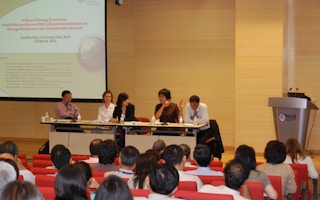It’s been more than two months since the high-level Economic Strategies Committee (ESC) report was launched, and while the buzz that followed the launch has mostly focused on how to raise Singapore’s productivity, there is a lower-profile but equally important aspect of the report that deserves more attention: Transforming Singapore into a smart energy economy.
A quick recap: the report had five central recommendations to make: diversifying Singapore’s energy sources; enhancing infrastructure and systems; upping energy efficiency; promoting the green economy; and pricing energy right.
These recommendations were set against the backdrop of a world in which energy prices will only trend upwards as fossil fuels are depleted even as global demand grows. Issues concerning an increasingly carbon-constrained world due to climate change risks, not to mention energy security, will also undoubtedly have a direct impact on the energy landscape and government policy.
The report suggests that Singapore’s strength in technology will help us overcome energy challenges, but the country must keep abreast of global energy developments.
This is the rationale behind the Government’s recently-launched feasibility study on nuclear energy, which signals a fundamental shift in energy policy which years ago had ruled out nuclear energy as an option.
But as regional countries such as Thailand, Vietnam, Indonesia and Malaysia - Singapore’s immediate neighbours - look to the clean power than nuclear provides, Singapore must “understand what it means, and whether there’s scope for us to participate”, according to the Republic’s Senior Minister of State S Iswaran, who co-chaired the committee’s report.
The report also moots the idea of coal and electricity imports, tapping on regional supply of cheap coal, and renewable energy sources such a geothermal and hydropower; it sets a target for Singapore to generate 5 per cent of its electricity demand from renewables by 2020.
The others include: investing and implementing intelligent energy systems, investing in energy infrastructure such as liquefied natural gas (LNG), increasing energy efficiency via incentives, education and legislation, promoting green transportation and capabilities of a green economy, making energy R&D a key priority and pricing energy to reflect its true cost including externalities.
At a recent panel session I moderated organised by the Energy Studies Institute (ESI), the merit of these ideas were put to public debate.
The consensus amongst panel members which included eminent economist Linda Lim of the University of Michigan, deputy head of the National University of Singapore’s Southeast Asian Studies programme Natash Hamilton-Hart, ESI chief economist Tilak Doshi and ESI chief scientist Michael Quah, was that the report made good recommendations that adequately balanced sustainable energy policies with Singapore’s economic growth.
But there were some issues that were clearly divisive.
- While investments and research into renewable energy were welcomed, ESI chief economist Tilak Doshi warned that renewables may appear sexy, but remain commercial unviable because of its high cost and long payback. Dr Quah added that Singapore must remain “technology agnostic” when it considers its energy options in the name of energy security.
Take coal, for example, which is a highly unpopular energy source for its dirtiness. If it is cheaper - even with a carbon price - should Singapore go ahead to use it to improve its energy security? As unpopular as it is, clean coal technology or carbon capture and storage might make such energy sources viable and the city should not close itself to that option, he said.
- Is Singapore’s ambition to becoming a global city - by promoting mega projects such as the integrated resorts which is hugely energy intensive - a boon to its economy or a bane from the energy policy perspective? Will such projects become a burden on Singapore’s energy industry when carbon is finally priced into the market?
Prof Lim held the view that some of Singapore’s choices - such as building the IR, or energy-intensive projects such as developing underground space - need a closer look. Can investments be made into Singapore’s economy that are less energy-intensive? Here, the marketplace could provide entrepreneurial ideas and innovations that make sustainable growth a reality, she suggested. But Singapore has to make that decision to choose less energy-intensive ways of growing.
Large manufacturing sites - such as Shell’s Pulau Bukom plant, or Renewable Energy Corp’s solar plant - make economic sense. But manufacturing is uncompetitive if located near cities due to its high cost of land and high energy consumption, she added.
Even boosting tourism - a central strategy of the government to sustain growth - and its transient population - does this make sense for Singapore from the energy perspective? She posed.
Energy conservation and energy efficiency are two different things. While Singapore’s push to drive efficiency is a good thing, it does not mean a reduction of energy or more security, she noted. There needs to be a change in culture and lifestyles of the population for energy conservation to happen, she said.
- The most vocal critique of the report came from Assoc Prof Hamilton-Hart who asserted that the report was “very timid.. and dare not push the boundaries”.
It is responsive on the ‘traditional’ areas such as energy efficiency and economic growth, but there is little mention of ‘out-of-the-box’ measures such as energy conservation and emissions controls, she noted. There were no mandates on energy efficient labelling, nor an expansion of green vehicle rebates, and counter-intuitive penalty taxes on diesel vehicles which are now more efficient than its petrol counterparts.
The perceived ‘timidity’ of Government policy was debated in light of another central strategy of the report: pricing energy right.
Dr Tilak said that if energy is priced right, the market will “take care of itself”, ie. people will naturally use less energy, more efficient sources such as renewables will gain competitive advantage. But Assoc Prof Hamilton-Hart highlighted that market failures exist and if government policy is not in place, the market - and the economy - will not respond. Are mandates and legislation the most effective tools for a transformation into a green economy?
Prof Lim asserts that one of the central roles of Government is to take the lead. In the US, she observed, the government is at risk of being thrown out every four years. In a country like Singapore, where that hasn’t happened for four decades, it is the “perfect situation” for the Government to take bold, brave, unpopular actions to price energy right - even if this means going up.
Dr Tilak counters that Singapore can play a leading role in policy - such as setting voluntary emission reduction targets - but it cannot do things “unilaterally, without looking at economic competitiveness”. This behaviour, he noted, although lamentable by some critics, is a symptom of the ‘tragedy of the commons’.
It remains to be seen whether making the first move and implementing bold policies will turn out to be Singapore’s “first-mover’s advantage”, or damaging to its own competitiveness. But given its history, Singapore is unlikely to move in the brave direction and put its neck out ahead of others. It has in the past adopted a conservative approach to policy change - but with its push towards innovation and a green economy, we can be hopeful for the winds of change yet.
One thing is clear to me: Singapore’s energy policy will undoubtedly continue to be scrutinized - its role in Singapore’s future will remain a key one - and this debate is just the beginning.











